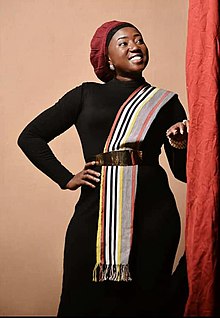
Burkina Faso, officially the People's Republic of Burkina Faso, is a landlocked country in West Africa, bordered by Mali to the northwest, Niger to the northeast, Benin to the southeast, Togo and Ghana to the south, and Ivory Coast to the southwest. It covers an area of 274,223 km2. In 2021, the country had an estimated population of approximately 23,674,480. Previously called the Republic of Upper Volta (1958–1984), it was renamed Burkina Faso by former president Thomas Sankara. Its citizens are known as Burkinabè, and its capital and largest city is Ouagadougou.

Ouagadougou or Wagadugu is the capital of Burkina Faso, and the administrative, communications, cultural and economic centre of the nation. It is also the country's largest city, with a population of 2,415,266 in 2019. The city's name is often shortened to Ouaga. The inhabitants are called ouagalais. The spelling of the name Ouagadougou is derived from the French orthography common in former French African colonies.

The culture of Burkina Faso in West Africa is also called the Burkinabé culture.

Football is the most popular sport in Burkina Faso. And the national association can look back on recent developments with a great deal of pride. Reaching the semi-finals of the African Cup of Nations on home soil in 1998, reaching the knockout stage for their first FIFA World Youth Championship in 2003, and appearances at two final competitions of the CAF U-17 Cup, as well as third place at the FIFA U-17 World Championship in Trinidad and Tobago in 2001 are the country's outstanding achievements at international level. The nations most famous players include Kassoum Ouegraogo, nicknamed Zico, who had his most successful seasons with Espérance de Tunis before ending his career in Germany, Siaka Ouattara, who spent his entire career with Mulhouse in France, and Moumouni Dagano, who was voted best African player in Belgium in 2001, when he played for the Belgian side Genk. He later went on to play for the French side Guingamp before transferring to another French team, FC Sochaux in 2005. Burkina Faso received an unexpected free pass into the group stage of the 2006 FIFA World Cup qualification process, when their opening round contestant, the Central African Republic, withdrew from the competition. This gave the West Africans, who were at that stage ranked 14th on the continent, the certainty that their name would be in the hat when the Preliminary Draw for the 2006 FIFA World Cup in Germany was made. They got off to a flying start, beating Ghana 1-0 in their opening match and laying down a marker for their Group 2 adversaries South Africa, Cape Verde Islands, Congo DR and Uganda. The victory train began to come off the rails with two defeats to Cape Verde, and with a record of two wins and three losses, Burkina Faso were up against it at the half-way stage. Frenchman Bernard Simondi took over the coaching reins from Ivica Todorov and made the team harder to beat at home, even recording wins over South Africa and Congo DR, but in the end it was not quite enough, and the likes of Abdoulaye Cisse, Moumouni Dagano, and Wilfred Sanou went no further in the competition.

Burkinabé literature grew out of oral tradition, which remains important. In 1934, during French occupation, Dim-Dolobsom Ouedraogo published his Maximes, pensées et devinettes mossi, a record of the oral history of the Mossi people. The oral tradition continued to have an influence on Burkinabé writers in the post-independence Burkina Faso of the 1960s, such as Nazi Boni and Roger Nikiema. The 1960s saw a growth in the number of playwrights being published. Since the 1970s, literature has developed in Burkina Faso with many more writers being published.

Salif Diallo was a Burkinabé politician who was President of the National Assembly of Burkina Faso from 2015 to 2017. He was a key associate of President Blaise Compaoré from the 1980s to the 2000s, serving in various posts during that period, including as Director of the Cabinet of the President from 1987 to 1989, Minister of Environment and Water from 1995 to 1999, and Minister of Agriculture from 2000 to 2008. He was appointed as Burkina Faso's Ambassador to Austria later in 2008. He also served as Vice-President of the Congress for Democracy and Progress, the ruling party.

Dominique Claudine Nouvian Ouattara is the current First Lady of Ivory Coast, married to President Alassane Ouattara.

Paul Kaba Thieba is a Burkinabé economist and politician who was appointed and served as Prime Minister of Burkina Faso from 6 January 2016 to 19 January 2019. Thieba was appointed by President Roch Marc Christian Kaboré on 6 January 2016, shortly after Kaboré took office. Previously he worked at the Central Bank of West African States and the West African Monetary Union.
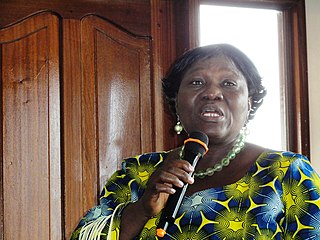
Joséphine Ouédraogo is a Burkinabé sociologist and politician. She served as Minister of Justice of Burkina Faso from 2014 to 2016.
Naba Baongo II is the current Mogho Naba, the constituent king of the Mossi people of Burkina Faso. According to oral tradition, he is the 37th king of the Mossi. As king, he is seen as a symbol of tradition and still retains influence in political matters within the country, and elected MPs, ministers, and ambassadors are known to seek his approval.
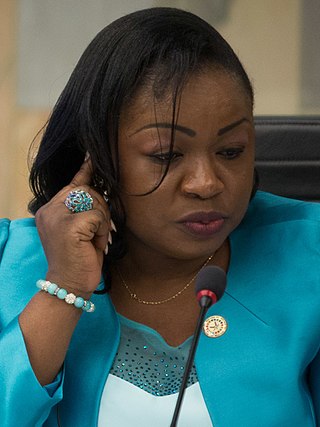
Hadja Fatimata Ouattara is a Burkina Faso politician who was Minister of Digital Economy and Postal Development from February 2017 to January 2022.

Apolline Traoré is a Burkinabé filmmaker and producer.
Safiatou Lopez-Fafié Zongo is a businesswoman and Burkinabé political activist.

Kady Traoré is a Burkinabé actress, film director, and film producer.
Jacqueline Ki-Zerbo née Coulibaly was a Malian women's rights activist, pro-democracy activist and activist in the endogenous development of Africa. She was involved in the popular uprising of January 3, 1966 in which she led a group of women and young girls who marched on the presidency with inscription such as “water, bread and democracy for the people." She was awarded the Paul G. Hoffmann Award for outstanding work in national and international development in 1984.
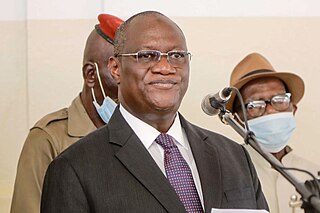
Téné Birahima Ouattara is an Ivorian politician who is currently the Minister of Defense of Ivory Coast. He has previously served as the country's Minister of Presidential Affairs and head of the national intelligence department. He is the brother of Ivorian President Alassane Ouattara.

Philomaine Nanema, also Philo is a Burkinabe comedian and actress. She is the recipient of the 2020 ECOWAS prize for best young comedian. In 2022, she co-presented Hello Doc, a series intended to encourage COVID-19 immunisation in Africa.
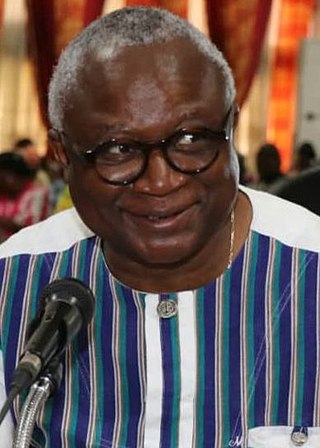
Armand Roland Pierre Béouindé is a Burkinabe politician who served as the mayor of Ouagadougou between 2016 and 2022.
Amina Mousso Ouédraogo real name Aminata Mousso Traoré is a Burkinabé lawyer and politician. She is the first woman to occupy the position of mediator of Burkina Faso from 2005 to 2011.
